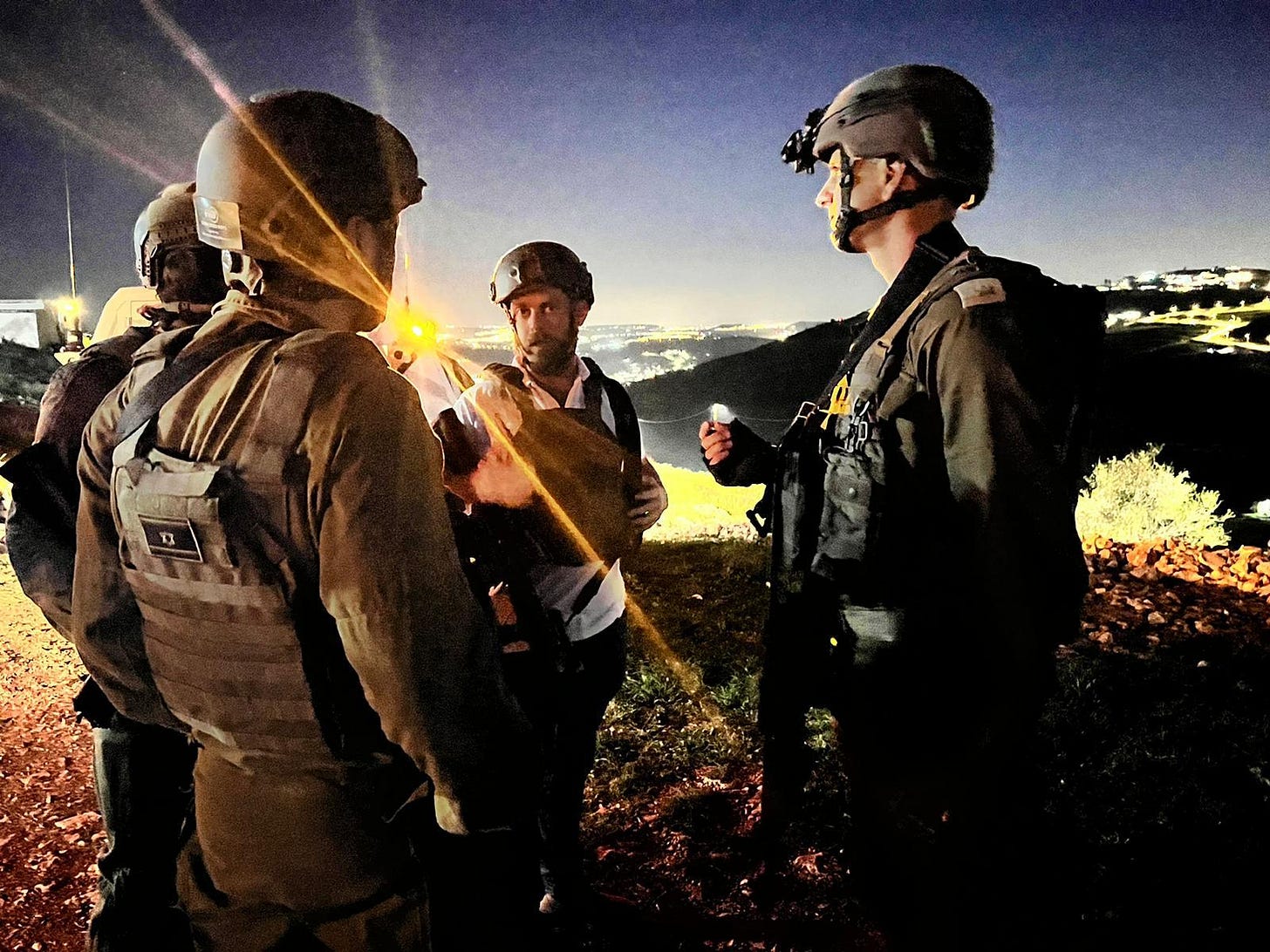DAY 158 OF THE GAZA WAR: Hostages - Do We Care Enough? Escalating Fighting on Lebanese Border, US Intelligence Report Stirs Controversy
Tel Aviv Diary, March 12, 2024
This afternoon, I walked past the area known as “Hostage Square”, situated in front of the Tel Aviv Art Museum. I pass by often, it is a familiar route, just a few blocks from my apartment. But this time, I was filled with an overwhelming sense of guilt. We were on our way out to lunch, and a stark realization hit me … our lives are moving forward, almost unaffected by the tragic, turbulent events unfolding around us.
In Tel Aviv, restaurants are full, concerts continue, and, by and large, life goes on. Yet, here we are, nearly 160 days later, more than 100 hostages still captive in Gaza — many of whom, tragically, are subjected to sexual assault on a regular basis.
With Purim approaching, the question arises; Is it appropriate to celebrate? I raised this concern with a friend, who responded, "Should we commemorate Memorial Day every day?" I replied, "This year is different—we still have hostages being held in Gaza, and we’re clinging to the hope that those 100+ people are still alive. Life must go on, but should it proceed as usual?" I’m at a loss for an answer. Soon, I plan to visit my grandkids abroad. I already feel guilty at the thought of boarding a plane. Yet, five months have passed, and there is no resolution in sight.
Amidst all this, I find myself continually questioning why the world remains indifferent. It’s clear that in 2024, cutting off all food and water to Gaza is not an option. But how can anyone call for a ceasefire, without insisting on the unconditional release of the hostages?
I feel we are all becoming a bit numb to the situation. It’s been almost five months since I met the father who initiated the demonstrations at the Army Headquarters just one week into the war. He was fortunate; his wife and children were all returned in the first exchange. Horrifically, so many others have yet to return.
Meanwhile, despite all the recent disheartening updates regarding a potential hostage agreement, there are reports tonight suggesting that negotiations are still underway, offering a glimmer of hope that a deal might be achievable. Additionally, it was reported that the Israeli delegation to the talks has been seeking more flexible directives, a request that, according to various sources, Prime Minister Netanyahu has reportedly declined.
With heavy hearts, we learned that the number of living hostages has decreased by one. The somber announcement today revealed that soldier Itay Chen, presumed to be held in captivity, had in fact been killed by Hamas on October 7th. Chen's father, who had been who had been poignantly carrying around an hourglass filled with sand, appeared today with the hourglass empty, a profound symbol that time had run out for Itay. The family has resolved to hold off observing shiva until Itay’s body can be returned and properly buried in Israel.
IN THE NORTH
As anticipated, tensions in the North escalated today. Yesterday, Hezbollah launched a rocket assault on the Golan Heights and dispatched two drones into Israeli territory, areas Israel deemed beyond the usual zone of confrontation. In response, last night, the Israeli Air Force (IAF) struck a Hezbollah storage facility in Baalbeck, deep within Lebanon. The facility was identified as a drone storage center. In retaliation, Hezbollah unleashed with the most substantial rocket barrage of the war, firing 100 rockets at the confrontation line. Israel responded with a subsequent airstrike targeting the Baalbeck region.
Hezbollah issued a statement declaring that Israel’s recent assaults had crossed the line. Yet, so far, Hezbollah has limited their offensive to the Confrontation line. They have focused their increased rockets fire on attempts to overwhelm the Iron Dome, with targets that still remain close to the border. Tonight, Israel conducted strikes on Hezbollah positions in Syria, a tactic it has employed repeatedly in the past. I maintain my belief that, as of now, neither side wants an escalation to a broader conflict. That does not mean that it could not occur. However, despite some Israeli officials advocating for an all-out war, the timing isn't right. We are not prepared.
US REPORT STIRS CONTROVERSY IN ISRAEL
Today’s major story in Israel is centered on the annual publication of the US Director of National Intelligence’s Annual Threat Assessment of the US Intelligence Community. The entire report makes for compelling reading, yet, it’s the section on the Gaza Conflict that stands out— especially a portion that delivers a political assessment of the government, which I have included below.
The segment of the excerpt below in bold, (the political assessment of the government), led an unnamed very high government official (presumed to be Netanyahu) to assert, “Israel is not a US protectorate.” This official went on to claim that the US government is trying to oust Netanyahu.
Here is an excerpt from their assessment:
GAZA CONFLICT
The HAMAS attack against Israel in October 2023 and Israel’s responding military campaign in Gaza has increased tensions throughout the region as Iranian proxies and partners conduct anti-U.S. and anti-Israel attacks, both in support of HAMAS and to pressure the United States. Media coverage of the destruction and loss of life are being amplified by active social media campaigns on all sides, roiling public reactions among neighboring countries and around the world. Israel will face mounting international pressure because of the dire humanitarian situation in the Gaza Strip, and Iranian-backed attacks will jeopardize stability in Lebanon, Iraq, the Gulf, and the Red Sea. The risk of escalation into direct interstate conflict, intended or otherwise, remains high.
The Gaza conflict is posing a challenge to many key Arab partners, who face public sentiment against Israel and the United States for the death and destruction in Gaza, but also see the United States as the power broker best positioned to deter further aggression and end the conflict before it spreads deeper into the region.
Israel and Iran are trying to calibrate their actions against each other to avoid escalation into a direct full-scale conflict. We assess that Iranian leaders did not orchestrate nor had foreknowledge of the HAMAS attack against Israel.
Since October 2023, Iran has encouraged and enabled its various proxies and partners—including Hezbollah, Iranian-backed groups in Iraq and Syria, and the Houthis in Yemen—to conduct strikes against Israeli or U. S. interests in the region.
Hizballah is calibrating this pressure on Israel from the north while trying to avoid a broader war that would devastate Hizballah and Lebanon. Hizballah’s leadership, though, probably will consider a range of retaliatory options depending on Israel’s actions in Lebanon during the upcoming year.
In Iraq, Iranian-aligned militias almost certainly will continue attacks against U.S. forces in Iraq and Syria.
The Huthi’s continued ballistic missile, cruise missile, and UAV attacks against merchant vessels transiting the Red Sea, which are disrupting international shipping, and on Israel create a real risk of broader escalation.
Both al-Qa‘ida and ISIS, inspired by the HAMAS attack against Israel, have directed their supporters to conduct attacks against Israeli and U.S. interests. The HAMAS attack is encouraging individuals to conduct acts of antisemitic and Islamophobic terror worldwide and is galvanizing individuals to leverage the Palestinian plight for recruitment and inspiration to conduct attacks. The Nordic Resistance Movement—a transnational neo-Nazi organization—publicly praised the attack, illustrating the conflict’s appeal to a range of threat actors.
In regard to Gaza, Jerusalem remains focused on destroying HAMAS, which its population broadly supports. Moreover, Israel probably will face lingering armed resistance from HAMAS for years to come, and the military will struggle to neutralize HAMAS’s underground infrastructure, which allows insurgents to hide, regain strength, and surprise Israeli forces.
The governance and security structures in Gaza and the West Bank as well as the resolution of the humanitarian situation in Gaza and rebuilding will be key components of the long-term Israeli– Palestinian relationship.
Israeli Prime Minister Binyamin Netanyahu has publicly stated his opposition to postwar diplomacy with the Palestinian Authority (PA) toward territorial compromise.
Netanyahu’s viability as leader as well as his governing coalition of far-right and ultra-Orthodox parties that pursued hardline policies on Palestinian and security issues may be in jeopardy. Distrust of Netanyahu’s ability to rule has deepened and broadened across the public from its already high levels before the war, and we expect large protests demanding his resignation and new elections. A different, more moderate government is a possibility.
HAMAS’s and the PA’s continued animosity will be a factor in governance outcomes as will HAMAS’s broad popular support. Much also will hinge on Israel’s decisions regarding how to deal with Gaza in the aftermath of its campaign as well as scale and scope of its support for the PA.
POLITICS
Gideon Sa’ar announced that his Tikvah Chadasha party will split from Gantz’s—National Union Party and become a separate faction in the Knesset. Sa’ar is trying to create a right-wing alternative to the Likud. There is a place for such a party, but there are a number of players each attempting to create another option.
One of my readers asked me to elaborate on why I found it so disappointing that the Haredi candidate, Shmuel Greenberg, won the mayoral election in Beit Shemesh. It was only 30 years ago that the first ultra-Orthodox neighborhoods were built in Beit Shemesh. Now, 30 years later, a religious woman who is not ultra-Orthodox lost her seat because Ultra-Orthodox politicians could not accept a woman leader — who, by all accounts, was an effective mayor — running a city with a large ultra-Orthodox population. In many cities, the ultra-Orthodox population is growing. What does this say about the future for the non-ultra-Orthodox in those communities?
VICTORIA’S SECRET
Victoria’s Secret had planned to open retail stores across Israel this fall. These stores are finished and have been fully stocked for weeks. However, the company refuses to open the stores at this time, for fear of a backlash in other parts of the world.
–––––∞–––––∞–––––∞–––––∞–––––∞–––––∞–––––∞–––––
A PIECE OF HISTORY
Black Sabbath
In response to the escalating resistance from the Yishuv, the British government opted for decisive action. They initiated “Operation Agatha”, a plan designed to apprehend the Yishuv leadership, undermine the Palmach forces, and collect incriminating evidence against the Haganah's activities. This operation began on June 29, 1946, and came to be referred to as "Black Sabbath" among the members of the Yishuv community.
Despite its lofty objectives, “Operation Agatha” was largely unsuccessful. While the British managed to detain approximately 200 Palmach members, the majority of the Yishuv leadership evaded capture. In total, around 2,700 Yishuv members were arrested. Ben Gurion, who was abroad at the time, remained unscathed, as did most of the Haganah leadership. However, a few key leaders were taken into custody.
Outraged by the British operation, Ben Gurion vehemently condemned it, comparing it to "a pogrom worthy of Czarist Russia or Hitler." Ben Gurion hastily traveled from France to the United States to exert pressure on the British. During his visit, Ben Gurion met with Supreme Court Justice and prominent Zionist Felix Frankfurter, passionately advocating for the liberation of Palestine from British rule.








What are the scenarios to get the hostages home? Ceasefire and release prisoners for a number of hostages, getting some but not all
what other scenarios?
Pull out of Gaza and lose the war? Would Hamas release all hostages at that moment?
Win the war while rescuing the hostages.
It is excruciating
In the past, the British tried to destroy the state before it was born. In the present, the USA is trying to destroy the state which does exist.
The USA is trying to unseat the leader of the government of Israel as it has done in so many other countries in the past and caused chaos!
Israel is not a proxy state of USA